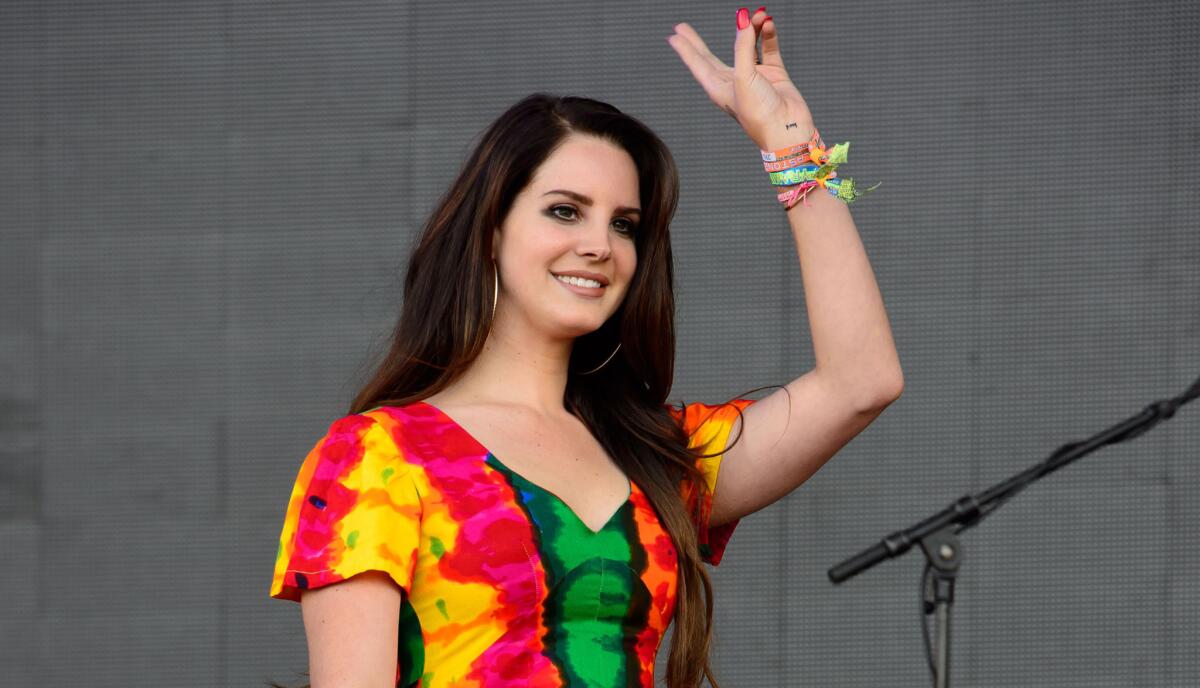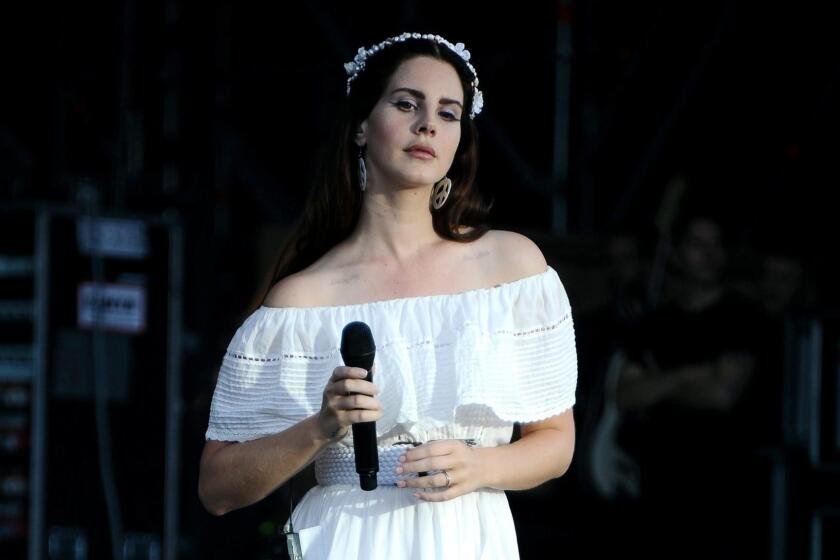Column: Lana Del Rey’s attack on Ann Powers reveals what people forget about criticism

- Share via
Did Lana Del Rey just accidentally strike a blow for … criticism?
Clearly that was not her intent. After pop music critic Ann Powers published a piece about Del Rey and her new album, “Norman F— Rockwell,”for NPR, Del Rey promptly took issue with a few of the phrases and tweeted her displeasure at Powers to her 9.5 million followers.
Naturally, many of those followers, and perhaps a few Twitter stalkers looking for any excuse to intimidate, saw it as a troll call to arms. Comments about Powers were soon a far too familiar storm of hate, littered with calls for Del Rey to “end” her, a general condemnation of critics as bullies and, of course, the sexualized name-calling that female critics and writers still face on a near-daily basis (“fat whore” remains a top pick).
It was not a joking matter, as any targeted writer who has been doxxed, hacked, swatted or simply deluged with horrifically personal threats and commentary can tell you. Artists, as Powers herself said in a statement to The Times, have every right to criticize their critics, and Del Rey’s tweets were fairly mild — she took issue with references to her “persona” and a description of her lyrics as “uncooked” and she did so without profanity or even shade-throwing emojis.
But she also did it on Twitter and @ed Powers. At a time when the president of the United States regularly abuses anyone he considers a critic, it is not surprising that Del Rey fans, many of whom came of age with social media, consider it perfectly natural to attack Powers for upsetting their idol. If Henry II had been a pop musician with 9 million young and devoted followers, he wouldn’t have had to ask, “Will no one rid me of this turbulent priest?” as Peter O’Toole plaintively asked in the movie “Becket.” He would have just had to tweet “side note @ThomasBecket, you don’t understand how hard it is to be king.”
Singer Lana Del Rey didn’t mince words on Twitter when she roasted NPR music critic Ann Powers’ review of her latest album, “Norman F— Rockwell.”
But a funny thing happened on the way to #DelReygate; people pushed back.
The piece in question, which opened with a poetically grim contemplation of the trash-strewn, bathroom-challenged nature of L.A. beaches, was a mostly positive, often poetic and excrutiatingly thoughtful dive into the album and Del Rey’s career. And Powers has plenty of her own fans. They responded with equal if less profane heat, characterizing Del Rey’s response as a thin-skinned tantrum that was, at best, a very bad look and, at worst, a deliberate attempt to summon the dark forces of social media to harass Powers while dealing music criticism, and by extension all criticism, yet another blow.
A few went a little far as well, suggesting that Del Rey should be grateful that Powers had deigned to write about her at all, but even that contributed to what became a fairly complex conversation about the importance and nature of criticism.
Which has always been a fairly complex topic. “Love/hate” does not even begin to describe the thorny relationship that began, no doubt, when some citizen of the Paleolithic Age glanced at a friend’s drawings and remarked that while the head and tail of that pig-deer looked pretty good, the legs definitely needed some work and why is everything brown?
There have been many high words exchanged between artists and their critics, and the music industry in particular thrives on feuds. Nowadays, many artists claim they do not ever read reviews (I began to seriously doubt this claim when a writer I greatly admired declared just that in an interview and then went on to quote, word for word, a review she found especially objectionable).
If they don’t, however, their fans certainly do and digital technology has given them a way to express their feelings in great number and real time.
Add to that a growing consciousness of criticism’s still overwhelming white maleness and an often politically motivated belief that journalists in general are part of a pandering elite and you have an atmosphere in which any criticism that is less than glowing is seen as an attack. Not just of the artist personally but anyone who enjoys the work.
The Del Rey versus Powers fight was notable in part because it was so odd —Powers isn’t just highly respected, she has, as many of her defenders pointed out, a long a history of advocating for female artists. And Del Rey, who knows what it’s like the be the center of Twitter-hate, is provocative but rarely incendiary.
The slap-back backfired — not only did Del Rey get called out, but her tweets drew people to a story that many might have missed — in part because it was so uncalled-for, but also because it revealed a fundamental misunderstanding of criticism.
It’s easy to hate on critics; they’re called critics for heaven’s sake. Yet however you may feel about a certain critic or a certain review, criticism exists to help sustain the conversations that keep any art form alive and growing by reminding people of its significance.
As any artist (and, certainly, her or his publicist) will tell you, the only thing worse than a bad review is no review at all. Social media has undoubtedly elevated word of mouth to a more powerful level, but critics remain vital to artistic discourse because that is their job. Some are better than others, and certainly the pool should be more diverse, but to attack critics in general as “bullies” is absurd.
Also, as a former member of their ranks I can tell you, with certainty, that if most critics had the kind of power and influence many people assign them, they would be paid much better.
So, thank you, Lana Del Rey for demonstrating, however accidentally, why critics matter. Though I do think Powers was a bit hard on L.A. beaches.
More to Read
The biggest entertainment stories
Get our big stories about Hollywood, film, television, music, arts, culture and more right in your inbox as soon as they publish.
You may occasionally receive promotional content from the Los Angeles Times.












